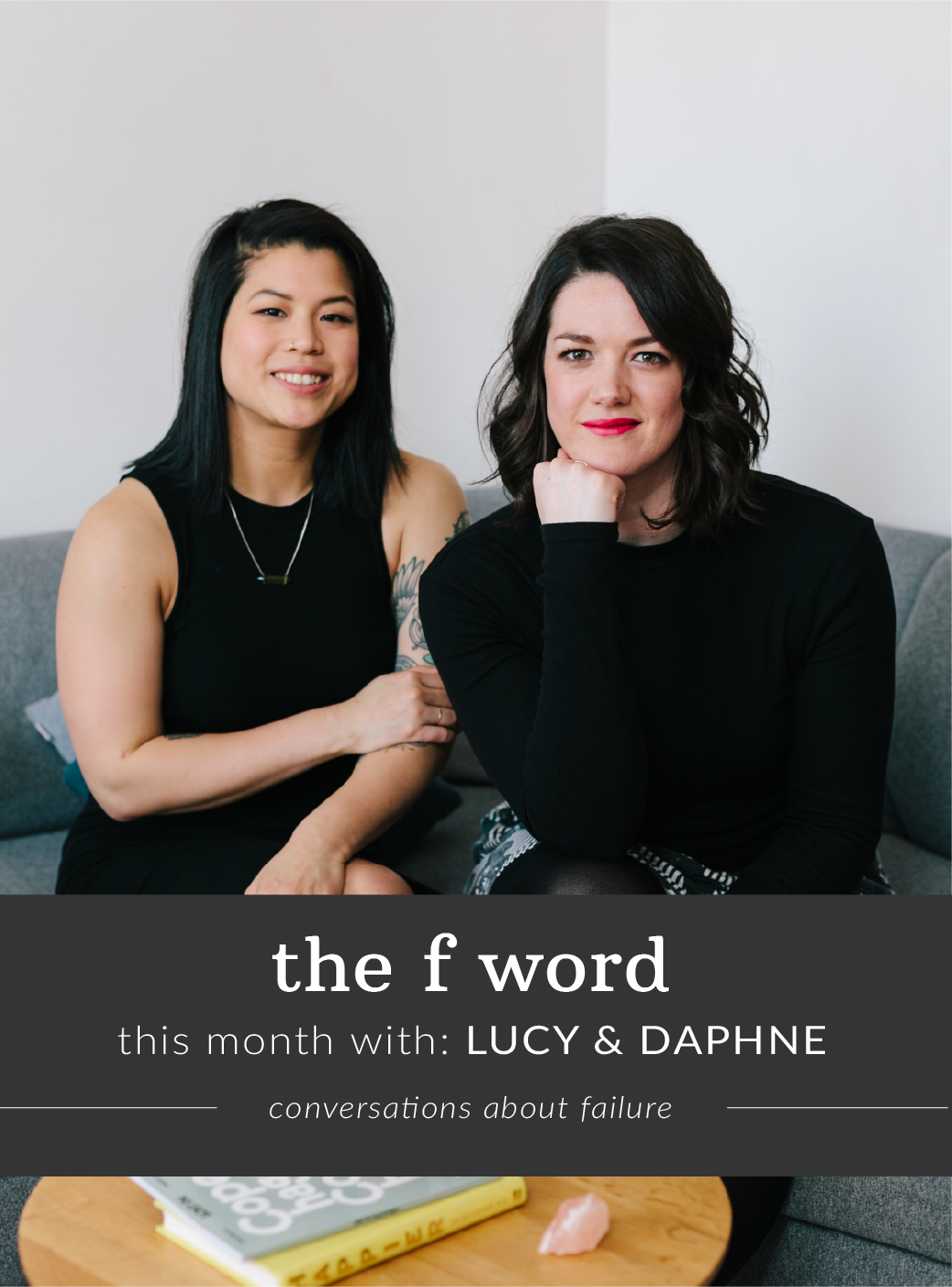The F-Word: Lucy & Daphne
To kick off the series, who better to sit down with than the two ladies of Design Build Grow themselves? Lucy and Daphne helped us break the seal on the topic of failure by sharing honestly and openly about what makes them different from one another. Lucy’s an extrovert, Daphne’s an introvert. Lucy’s from England, whereas Daphne’s a born and bred Vancouverite. From discussing how they define failure to how their childhoods affected the way they learned what failure meant, it was a pleasure to see these business partners discover more about each other through the process of defining one of life’s messiest topics.
As a side note, before we jump in, Daphne is on the left in the photo👇🏼, and Lucy is on the right!
Let’s kick it off with the basics. How do you define failure?
Lucy: For me, failure is always more about things I’ve promised to myself or other people and when they aren’t met. Those are like my personal feelings of failure that I put on myself, rather than an outward feeling like I’m failing in the eyes of society. So that drives me to follow through on them, because I don’t want to fail.
Daphne: I understand so much more about you now. I’m always like ‘Why are you panicking about this?’ Failure to me is ultimately the endgame that didn’t work out. Along the way, there will always be miniature failures, but to me that’s just expected. Having everything fold under is what failure is to me, being back at square zero and losing access to the design world.
INTERESTING. DO YOU FEEL LIKE BEING AT SUCH DIFFERENT ENDS OF THE SPECTRUM HELPS YOU AS BUSINESS PARTNERS?
Lucy: It’s normally an asset, Daphne bringing me back down to earth a little bit by saying ‘It’s fine, it’s okay, it’s not the end of the world’. So I think in some ways it balances - I’m like ‘no no this has to be done right now’, and my panic will affect Daphne and then her logic brings me back down when she’s tells me to stop stressing.
Daphne: I do agree with that, it is definitely an asset. Because while I’m able to keep Lucy from panicking, also Lucy is the one who tells me ‘We need to do all these things’. So while I can maybe bring her stress level back down a bit, Lucy definitely keeps us on track and makes sure that things get done. It's a really good dynamic.
HOW DID YOUR CHILDHOOD AND YOUR RELATIONSHIP WITH YOUR PARENTS AFFECT YOUR RELATIONSHIP WITH FAILURE AND YOUR PATH TOWARDS BECOMING AN ENTREPRENEUR?
Lucy: I remember being eight or nine years old and saying to my dad ‘I just want to be a kid’. Because I felt this pressure to be more grown up and act more like a teenager than I actually was. I think there was always competition from my Dad among all of my siblings. There would be comparisons of report cards, grades, athletic prowess. But on the other hand my family is very split, because I am my mom’s only child, but I have a lot of step and half-siblings. So I would get that pressure from my Dad, but on the other hand I am my mom's One True Only Child. She had multiple miscarriages and failed pregnancies before me and I’m the One Rainbow Child that made it through. I think that probably put a lot of pressure on me to live up to those things and I only really recently realized that. I don’t think my mum ever pressured me though. If I was happy, she was happy, even when I was the first person on my mum’s side to not go to Uni, which was quite a big deal. I think she had high hopes I’d go to Oxford or study English or something, and I was like ‘I’m going to drop out and study art and never get a degree.’ But she was really cool with it, so I feel like my pressure to succeed must be very self-internalized.
Daphne: Financial security is such a big deal for my family. That’s one of those things that's ingrained in me, and I’m trying to not let it affect me as much, but it still looms over me a lot, sometimes. I don't have as much arts or design experience [as Lucy], so I guess that is what I’m worried about in terms of failure. I think Lucy’s mom was always really encouraging in that sense. My family is a little more practical so they don’t really understand the design world as much so I definitely feel those pressures. They’ll never say anything in particular but I still go to my family a lot when I have issues. So, that’s another thing — what will they think if I fail?
WHY DO YOU THINK IT’S SO HARD FOR PEOPLE TO TALK ABOUT FAILURE?
Lucy: It’s shame and pride, isn’t it.
Daphne: Because then you would have to admit it to yourself that something is wrong, I think that's the hardest thing. For me, the lack of control and what is unknown is one of the scariest things, that ego thing of you can kind of pretend it’s all fine because you’re not admitting it to yourself. It’s almost not about admitting it to the world, but internally accepting ‘I didn’t do this properly’ or ‘I failed at something.’
AND WHY DO YOU THINK IT’S SO IMPORTANT FOR PEOPLE TO TALK ABOUT THEIR FAILURES MORE OFTEN?
Daphne: I don’t think that we’ve ever talked about it the two of us before. When I was told the topic of the series, I was like ‘This is a strange and depressing topic’. But now that we’ve talked about it, I see that it's really necessary. It's a thing that happens. It’s not a bad thing, necessarily. Things change and being able to embrace that is kind of nice.
Lucy: Yeah, Mara you and I have talked about this before, this idea that freelancing or being an entrepreneur and earning money for yourself is glamorized. You don’t necessarily have an employer riding you but you still have clients. You don’t have defined hours which means it's flexible but then sometimes you’re stuck working at 1am. It’s exhausting sometimes. I think people are only just now starting to talk about it and say ‘Hands up. This is hard, but you’re not the only one’. And that's coming at a time when people are realizing from social media and blogs and the Pinterest-beautiful life and that things don’t actually look like that. It adds to the failure, honestly, and the shame and pride and ego. I think if we can all just say ‘We’re all just faking it, let's be honest’, it’d be better. It brings people together, when you can break down that wall and be a bit more honest and real and vulnerable and connect with people on something like failure.
Stay tuned next month, when we’ll be speaking with Anita Cheung, the entrepreneur behind wellness businesses such as Moment Meditation, Vancouver’s first dedicated meditation studio.


